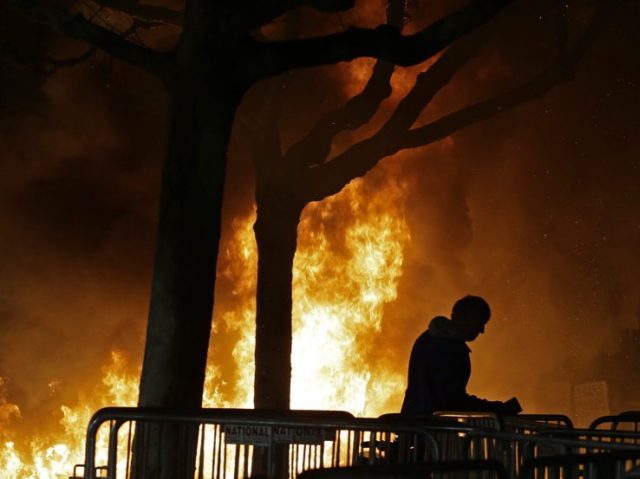Politico’s David Siders offered a revisionist history of the violent suppression of free speech at the University of California Berkeley on Thursday with an article titled: “How Berkeley became a hotbed of violence in the Trump era.”
In a classic example of question-begging, Siders, assuming Trump is the catalyst, began his farcical explanation with a visit by Trump supporter (and then-Breitbart editor) Milo Yiannopoulos to the Berkeley campus in February.
But suppression of free speech at Berkeley by leftist mobs began long before.
As recently as 2014 — during the 50th anniversary celebrations of the Free Speech Movement, no less — a mob of left-wing radicals broke up a speech by entrepreneur Peter Thiel, bursting into the hall where he was speaking to students and forcing him to flee for his physical safety. The event occurred long before Trump declared his candidacy for the presidency, and even longer before Thiel became a Trump supporter.
In 2000, as Breitbart News’ Daniel J. Flynn recalled, “a similar mob, including many looking like they had crawled out from under a dock in the marina at the end of University Avenue, drowned my words with shouts of “murderer,” “racist,” and “Nazi.” They attempted to rip the microphone cord from the wall. A hirsute man ‘mooned’ me. And, in one last indignity, the hecklers seized my writings to fuel an actual book burning.”
Flynn added: “This all happened under the watchful eyes of two pleasant Cal policewomen.”
Little has changed. During the anti-Milo riot, the campus police were ordered to take as little action as possible as the intolerant mob destroyed public property.
To add insult to injury, the student editors of the Daily Californian then defended the anti-Milo rioters by publishing a series of essays justifying the use of violence to shut down conservative speech.
Trump is only the latest pretext. The reason that Berkeley has become a hotbed of violence is that the campus has long ago rejected the ideals of the Free Speech Movement, and embraced a totalitarian “progressive” mindset that rejects all dissent.
There are occasional exceptions. Almost a year before Thiel spoke, Sen. Rand Paul (R-KY) addressed a standing-room-only crowd at Berkeley, and received a standing ovation.
But that was before Black Lives Matter was launched — and before the media began excusing violent riots carried out in the name of that cause.
In between radical movements, the intolerance festers at Berkeley, waiting, opportunistically, to emerge as “protest.”
As one of the veterans of the original Free Speech protests in 1964, philosopher John Searle, lamented in 2014, Berkeley has not achieved that movement’s goals, partly because of its hostility toward conservative views.
In explaining the latest violence by reference to Trump alone, Politico’s Siders has repeated a mistake the media made — at times deliberately — in reporting the 2016 campaign: namely, blaming Trump for violence deliberately launched by leftists with the self-described goal of creating a sense of “anarchy” around the candidate and fear among the public.
It is precisely because the media fail to hold the campus left accountable that the problems at Berkeley, and other campuses, persist.
Joel B. Pollak is Senior Editor-at-Large at Breitbart News. He was named one of the “most influential” people in news media in 2016. His new book, How Trump Won: The Inside Story of a Revolution, is available from Regnery. Follow him on Twitter at @joelpollak.

COMMENTS
Please let us know if you're having issues with commenting.